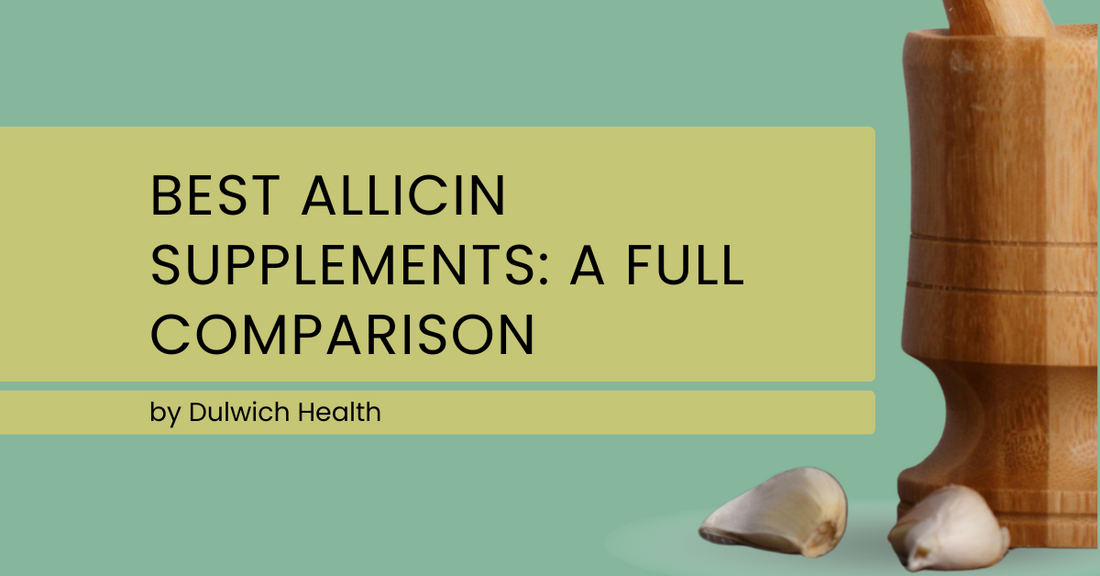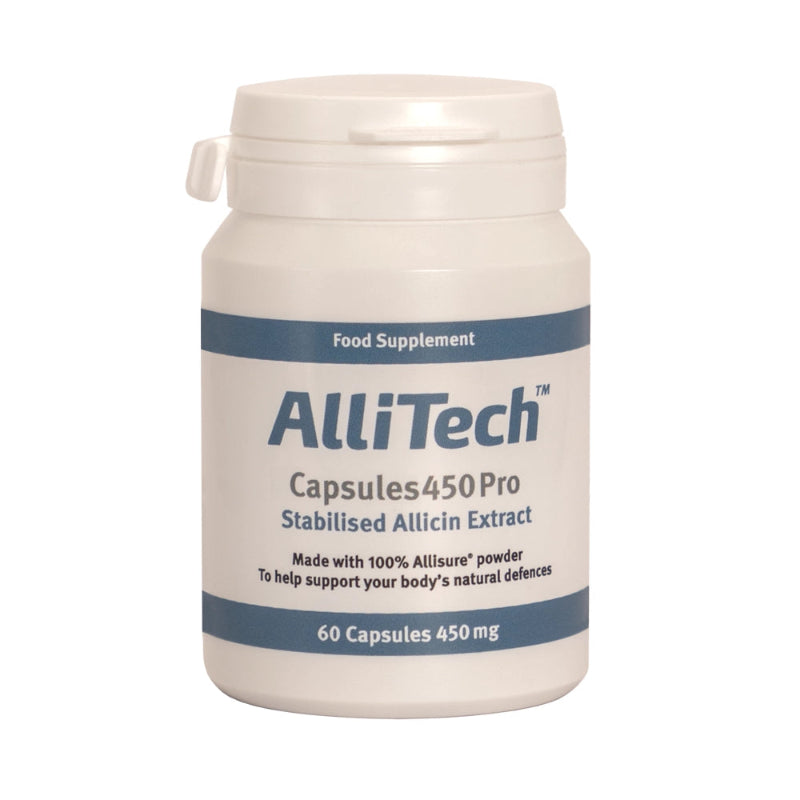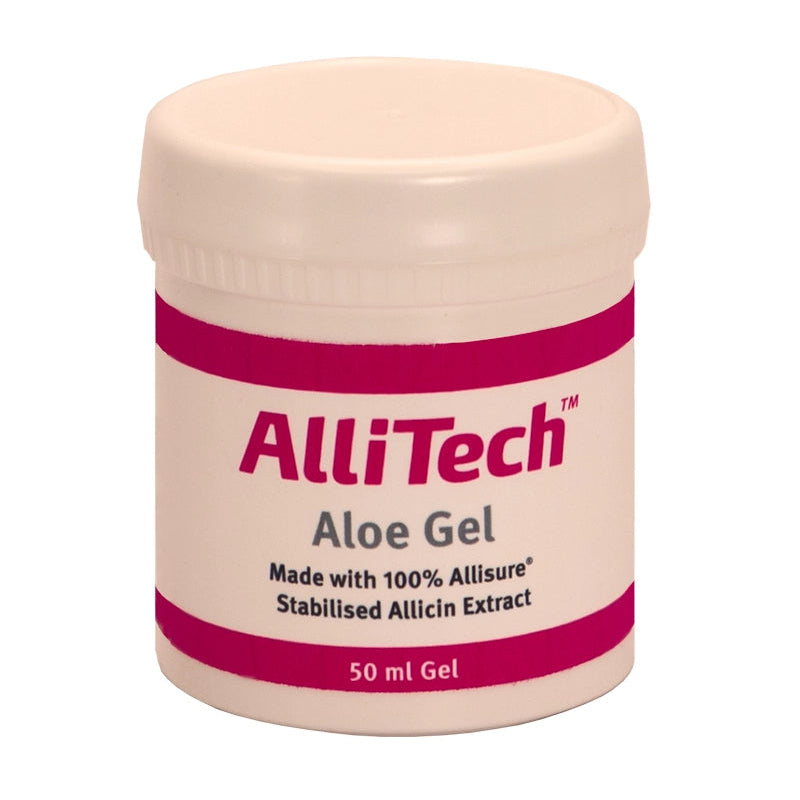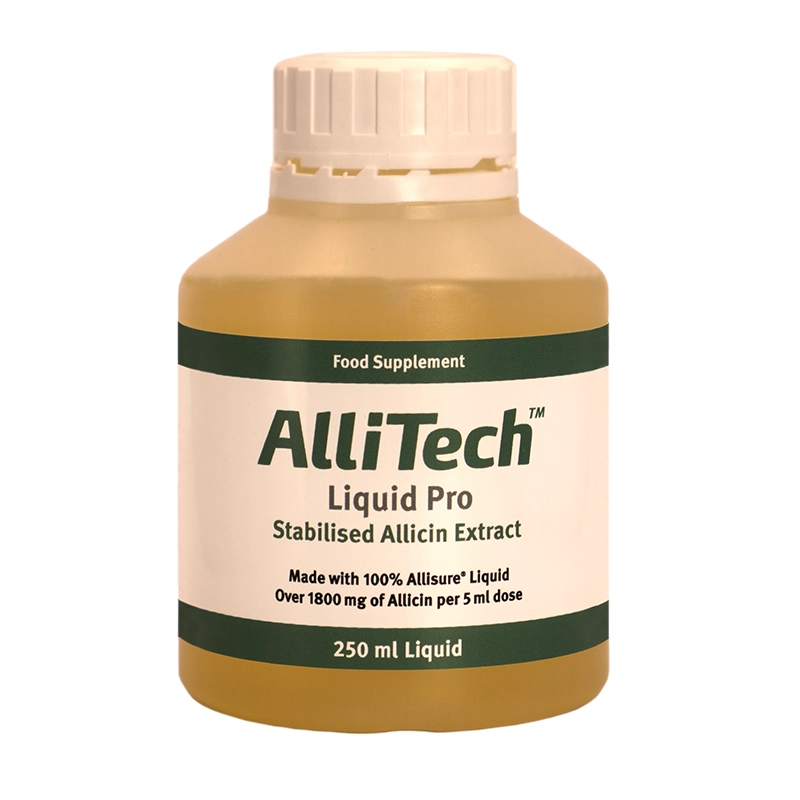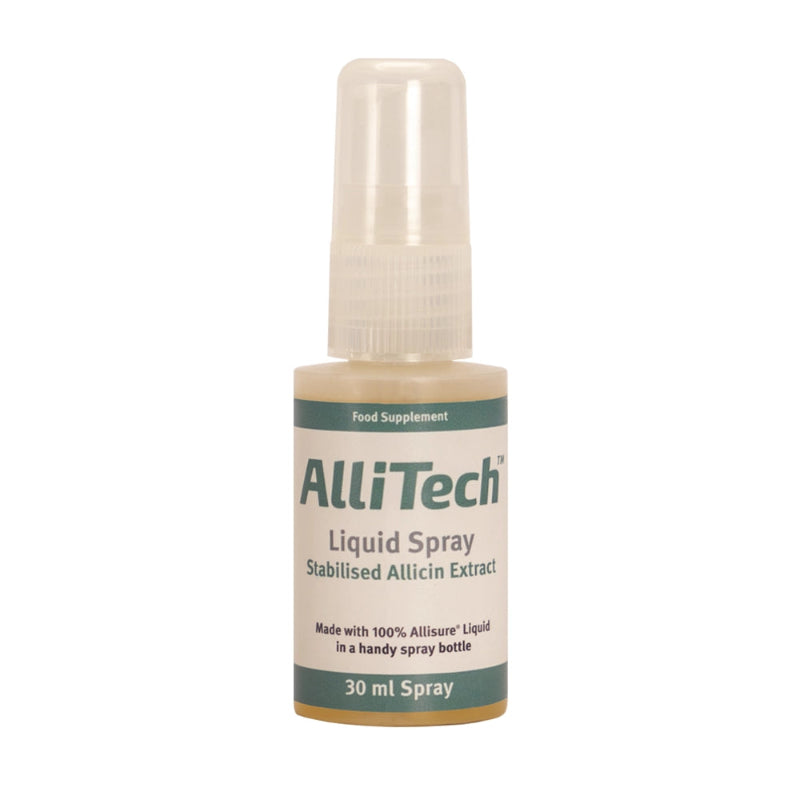Allicin, the potent compound found in garlic, has long been praised for its antimicrobial, immune-boosting, and heart-supporting benefits. But with so many garlic supplements on the market, how do you know which ones actually deliver real, stabilised allicin and which are just glorified garlic powder? This guide will walk you through everything you need to know to choose the best allicin supplement for your needs, from understanding how allicin works to knowing what ingredients, certifications, and forms to look for.
Table of Contents
- The “Why” of Allicin: Understanding its Core Benefits
- The Crucial Factor: Stability and Bioavailability
- Forms of Allicin Supplementation: Tailoring to Your Needs
- Quality and Purity Standards
- Suitability and Dietary Considerations
- Trust and Credibility
- Dosage and Usage Guidelines
- Potential Side Effects and Interactions
- Choosing the Best Allicin Supplement for You
The “Why” of Allicin: Understanding its Core Benefits
Before we dive into what to look for in the best allicin supplements, it’s essential to understand why someone might want to take one in the first place. This sets the stage and helps explain why allicin has become known as one of nature’s most powerful health allies.
A. Brief Introduction to Allicin

Allicin is often called the “magic molecule” in garlic, the very compound responsible for garlic’s distinctive aroma and many of its renowned health benefits.
But here’s the interesting part: allicin doesn’t actually exist in whole, raw garlic. Instead, it’s formed when garlic is chopped, crushed or chewed, which brings two separate compounds, alliin and alliinase, into contact. When these combine, they create allicin, a sulphur-rich compound that gives garlic its sharp smell and potent biological activity.
However, there’s a catch: allicin is naturally unstable. It degrades quickly, especially when exposed to heat or acid (like stomach acid), making it tricky to deliver effectively in supplement form. That’s why supplement makers have developed special methods to stabilise or extract allicin and why not all garlic supplements actually provide usable allicin.
B. Core Health Benefits of Allicin
Antimicrobial Powerhouse
Allicin is celebrated for its broad-spectrum antimicrobial effects. It can help fight:
-
Bacteria — including antibiotic-resistant strains like MRSA.
-
Viruses — such as those causing colds and flu.
-
Fungi — including Candida infections, athlete’s foot, and ringworm.
-
Parasites — supporting the body in resisting parasitic invasions.
It works by disrupting microbial processes, essentially weakening or destroying the pathogens without harming human cells, unlike some antibiotics, which can disturb the body’s own balance.
Immune System Support
Allicin is believed to strengthen the body’s natural defences, helping the immune system react more efficiently to threats. It may enhance immune cell activity and improve the body’s ability to fend off infections before they take hold.
Cardiovascular Health
Garlic and allicin have long been linked to heart health. Allicin may help:
-
Lower blood pressure, supporting healthier circulation.
-
Manage cholesterol, particularly by reducing LDL (“bad”) cholesterol.
-
Reduce clotting risks, thanks to mild anti-platelet effects that help blood flow more smoothly.
Anti-inflammatory & Antioxidant Effects
Allicin has been shown to combat oxidative stress and reduce inflammation in the body, helping to protect cells from damage and lowering the risk of chronic disease over time.
Digestive Health
Last but not least, allicin may help support the gut by balancing the microbiome. Its antimicrobial action can help manage harmful bacteria while supporting a healthier digestive environment.
✅ Summary takeaway:
Allicin is not just a trendy natural extract, it’s a compound with a broad range of well-studied and traditional health benefits. But because it’s so delicate and unstable, choosing the right allicin supplement is key to actually reaping those benefits.
The Crucial Factor: Stability and Bioavailability
When it comes to choosing the best allicin supplement, stability and bioavailability are the deal breakers. This is what separates true allicin supplements from ineffective garlic pills or powders that may smell promising but deliver little actual benefit.
A. The Allicin Instability Problem
Allicin is a notoriously fragile compound. From the moment it’s formed when garlic is chopped, crushed or chewed, it begins to degrade. Exposure to heat, light, oxygen, and especially stomach acid, rapidly breaks it down, rendering it inactive before it can do any meaningful work in the body.
This explains why most raw garlic or standard garlic powder supplements provide little to no active allicin. While they might contain alliin and alliinase (the precursors to allicin), these need to combine under just the right conditions to generate allicin, and even then, the resulting allicin usually doesn’t survive long enough to reach the bloodstream.
In short, just because a supplement says “garlic” or “allicin potential” on the label doesn’t mean it’s delivering active, bioavailable allicin where you need it.
B. The Solution: Stabilised Allicin (e.g., Allisure®)
This is where stabilised allicin comes in. Through specialised, patented processes, companies like Allisure® have figured out how to capture and stabilise pure allicin, preserving its molecular structure so it remains active, stable, and effective.
What does “stabilised allicin” mean?
It means that the allicin molecule has been extracted and kept intact, preventing the usual rapid breakdown that occurs with fresh garlic or garlic powders. This stabilised form can be formulated into liquid, capsules, sprays, or gels, all with a reliable and measurable amount of active allicin.
Why does this matter?
Because bioavailability, the ability of the compound to survive digestion and enter the bloodstream is what ultimately determines whether you’ll experience allicin’s health benefits. Only stabilised allicin can bypass the degradation that usually occurs in the stomach, ensuring that enough active compound circulates through the body to have an impact.
Allisure® is one of the best-known and most widely respected examples of patented stabilised allicin technology. It’s backed by scientific research and years of clinical use, providing a benchmark of quality and effectiveness that consumers can trust.
✅ Summary takeaway:
Without stabilisation, allicin supplements are essentially garlic-flavoured placebos. To get the full antimicrobial, immune, cardiovascular, and anti-inflammatory benefits, look for products with 100% stabilised allicin, like Allisure®, backed by a patented process that guarantees bioavailability.
Forms of Allicin Supplementation: Tailoring to Your Needs

Once you understand the importance of stabilised allicin, the next step is to choose the right form of supplement for your personal needs. Allicin is available in several delivery methods, each with its own pros and cons. The best choice depends on what you’re aiming to treat and how you prefer to take it.
A. Oral Forms
These are by far the most popular and convenient form for daily supplementation.
Pros:
-
Easy to take, portable, and discreet, perfect for busy lifestyles.
-
Provide a measured, consistent dose.
-
Often odourless or low-odour, avoiding the classic “garlic breath” effect.
Cons:
-
Absorption can vary depending on how the capsule is formulated for example, whether it has an enteric coating to protect it from stomach acid.
-
Some garlic capsules only contain alliin and alliinase, relying on the body to generate allicin in the gut, which may produce little or no active allicin.
-
It’s crucial to check that you are getting actual stabilised allicin, not just garlic powder or alliin.
Dosage considerations:
Common strengths include 180 mg and 450 mg capsules. Liquid forms are often described as four times stronger than capsules, so if potency is a concern, keep this in mind when choosing.
Liquid allicin supplements offer the most direct and versatile delivery.
Pros:
-
Rapid absorption and high potency often described as four times stronger than equivalent capsules.
-
Versatile use: can be taken neat, mixed into cold drinks, or even used topically or via nebuliser for respiratory support.
-
Excellent choice when higher or more intensive doses are needed.
Cons:
-
May have a mild garlic taste, although generally less pungent than raw garlic.
-
Less convenient to carry around or use on the go compared to capsules.
Dosage considerations:
Typically measured in drops or teaspoons for example, 10 ml (2 teaspoons) twice a day, adjusted for children or more serious conditions.
B. Topical Forms
Ideal for skin-related conditions and delicate applications.
Pros:
-
Allows direct application to affected areas such as eczema, fungal infections, athlete’s foot, rosacea, acne, wounds, or intimate areas.
-
Often includes soothing ingredients like aloe vera for additional comfort.
Cons:
-
Strictly for external use, not intended for internal or oral use.
Designed for targeted, convenient use.
Pros:
-
Easy and direct application for sore throats or small skin issues like insect bites or leg ulcers.
-
Convenient for on-the-go use, quick to apply, no mixing or measuring required.
Cons:
-
Limited to specific uses, not a substitute for broader systemic supplementation when internal health support is needed.
✅ Summary takeaway:
Choosing the right allicin supplement form depends on your individual needs, whether you prioritise convenience, potency, or targeted application. For daily immune support, capsules or liquids are ideal, while gels and sprays shine for skin or throat care. Whatever you choose, ensure it contains stabilised allicin to get real, measurable benefits.
Quality and Purity Standards
While stabilised allicin is the cornerstone of an effective supplement, it’s not the only indicator of quality. To ensure you’re getting a product that’s both safe and effective, it’s important to look for additional signs of excellence in manufacturing and formulation.
A. Certification & Testing
Third-Party Testing
High-quality supplements should be tested by independent laboratories to confirm:
-
Purity — free from contaminants such as heavy metals, pesticides, or microbial impurities.
-
Potency — the advertised amount of active allicin is actually present per dose.
-
Safety — free from harmful or undeclared substances.
Look out for products that explicitly mention third-party or independent testing on their packaging or website. This shows a company’s commitment to transparency and quality.
Common Certifications
Reputable allicin supplements may also carry certifications like:
-
GMP (Good Manufacturing Practices) — assurance that the product is manufactured in a controlled, consistent, and hygienic environment.
-
Vegan / Vegetarian Approved — for those with dietary restrictions.
-
Non-GMO — if avoiding genetically modified ingredients is important to you.
These certifications provide additional peace of mind that the product meets recognised standards.
Standardisation
Look for products that clearly state the amount of active allicin per serving, not just the amount of garlic powder or extract. For example, a label stating “provides X mg of stabilised allicin per capsule” is far more meaningful than vague claims like “high potency garlic”.
B. Ingredient Transparency
Minimal Fillers and Additives
A good allicin supplement should have a clean, simple ingredient list, avoiding unnecessary fillers, artificial colours, flavours, or preservatives (except where stability requires, such as in gels).
Remember, the focus should be on the active allicin, not on padding the product with extra substances that offer no health benefit.
Allergen Information
Clear labelling is essential, particularly for those with sensitivities or dietary needs. Look for statements on:
-
Whether the product is free from common allergens like gluten, dairy, soy, or nuts.
-
Whether the capsule shell (for oral forms) is plant-based, which is important for vegetarians and vegans.
✅ Summary takeaway:
Beyond just having stabilised allicin, a top-quality supplement should meet rigorous standards of purity, potency, and transparency. Certifications, third-party testing, and clear ingredient labelling all point to a product you can trust and that’s worth investing in.
Suitability and Dietary Considerations
When selecting an allicin supplement, it’s not just about potency and quality, it’s also about whether the product fits your personal dietary needs and lifestyle. Here’s what to keep in mind to ensure the supplement you choose is right for you or your family.
A. Dietary Compatibility
Vegan / Vegetarian
Not all capsules are created equal. Check whether the capsule shell is made from plant-based materials (such as hypromellose) rather than gelatine, which is animal-derived. Many high-quality allicin supplements specifically state they are vegan or vegetarian friendly.
Gluten-Free
For those with coeliac disease or gluten sensitivity, it’s crucial to ensure the product is certified gluten-free. Even trace amounts can be problematic for sensitive individuals, so look for clear labelling.
GMO-Free
Many health-conscious consumers prefer supplements made without genetically modified ingredients. Non-GMO certification or claims on the label can provide reassurance.
Kosher / Halal
If these certifications are important for your dietary practice, check the product packaging or manufacturer website. While not all allicin supplements carry these labels, some brands may accommodate these requirements.
B. Age Group
Adults
Most allicin supplements are formulated for adults and follow standard dosage guidelines, often around 180 mg to 450 mg per capsule, or 10 ml per dose in liquid form. Always check the product instructions for specific recommendations.
Children
Paediatric use requires special care. Many products offer guidance such as half the adult dose for children over three, or suggest liquid forms for easier administration.
However, it’s important to consult a healthcare provider before giving allicin supplements to children, especially for therapeutic or long-term use.
C. Odour
The “Garlic Breath” Concern
One of the most common worries with garlic supplements is the lingering odour, both on the breath and sometimes through the skin. Fortunately, stabilised allicin products are typically odourless or have minimal odour compared to raw garlic or traditional garlic capsules. Look for products labelled “odourless” or “low-odour” if this is a priority for you, especially if you plan to take them daily.
✅ Summary takeaway:
Choosing the right allicin supplement isn’t just about strength and purity, it’s about matching it to your dietary needs, lifestyle, and age group. With the right product, you can enjoy the benefits of allicin without compromising on your health standards or comfort.
Trust and Credibility
With so many supplements on the market, it can be hard to separate marketing hype from genuine quality. This is why trust and credibility are essential factors when choosing the best allicin supplement. Here’s how to evaluate whether a product and the company behind it deserves your confidence.
A. Manufacturer Reputation
Start by looking at who makes the supplement.
-
How long have they been in business?
Established companies with a solid track record are generally more reliable than newcomers with little history. Longevity often reflects a commitment to quality and customer satisfaction. -
Do they specialise in allicin or garlic products?
Companies that focus specifically on garlic-derived supplements (rather than producing a wide, unrelated range of products) often have deeper expertise and invest more in research and development. -
Transparency about sourcing and manufacturing
Trustworthy manufacturers are upfront about where their garlic is sourced, how their allicin is extracted and stabilised, and what standards they follow during production. Look for brands that openly share this information on their website or packaging.
B. Scientific Backing
Scientific evidence is a major sign of product credibility.
-
Is there published research or clinical data supporting the product or its key ingredient?
For example, Allisure®, a patented stabilised allicin extract, is one of the few garlic-based ingredients with research behind it. Brands using such scientifically validated ingredients have a clear edge over generic or untested garlic supplements. -
Ongoing research
Allicin is being actively studied for a range of health conditions, from antimicrobial and antiviral uses to potential benefits in cardiovascular health, immune modulation, and even neurological conditions. A brand that stays engaged with scientific developments shows a commitment to evidence-based claims.
C. Customer Reviews & Testimonials
While science matters, real-world experience also carries weight.
-
Look for consistent positive feedback
Check customer reviews for repeated mentions of effectiveness, ease of use, good tolerability, and minimal side effects. This can offer reassurance about how the product performs in everyday use. -
Be cautious of exaggerated claims
If reviews or testimonials sound too good to be true, promising miraculous cures or instant results approach with scepticism. Genuine reviews often mention both pros and cons and feel balanced and authentic.
✅ Summary takeaway:
A reputable manufacturer, backed by scientific evidence and supported by real-world user experiences, is the gold standard when choosing an allicin supplement. Prioritise brands that combine expertise, transparency, and credibility to give you confidence in what you’re putting into your body.
Dosage and Usage Guidelines
Even the best allicin supplement can only work if it’s used correctly. Understanding how to take allicin and when is key to ensuring both safety and effectiveness. Below are some general guidelines to help you get the most from your supplement.
A. General Recommendations
-
Start low, go slow
Especially if you’re new to allicin supplements, begin with the lowest recommended dose to assess how your body responds. You can gradually increase if needed, following the product’s instructions. -
Follow the manufacturer’s instructions
Reputable brands provide clear dosage guidance on the label or accompanying leaflet. Always adhere to these guidelines, and don’t assume that “more is better.” -
Consistency is key for chronic conditions
For ongoing issues such as immune support or cardiovascular health, regular and consistent use is more beneficial than sporadic dosing.
B. Specific Situations
-
For general immune support or maintenance
Standard maintenance doses typically involve one to three capsules per day (e.g., 180 mg or 450 mg), or 10 ml of liquid twice daily, depending on the formulation. -
For acute conditions (e.g., colds, flu)
In some cases, a slightly higher dose may be suggested at the onset of symptoms, always within safe limits and as advised by the manufacturer or a healthcare provider. -
Topical application
For skin concerns, apply gels or sprays directly to the affected area. Follow the instructions regarding how often to reapply (often up to four times daily), and remember that these are not intended for internal use.
C. Timing
-
With or without food?
Many allicin supplements are best taken with food to minimise the risk of digestive upset, particularly for those with sensitive stomachs. Check the product label for specific recommendations.
✅ Summary takeaway:
Using allicin safely and effectively requires following the right dose, at the right time, for the right reason. When in doubt, especially for children, pregnant individuals, or those with health conditions, consult a healthcare professional before starting supplementation.
Potential Side Effects and Interactions
While allicin supplements are generally well-tolerated, they are not without risks especially at higher doses or when combined with certain medications. Understanding the potential side effects and knowing when to seek professional advice is essential for safe use.
A. Common (Mild) Side Effects
-
Garlic odour
Although stabilised allicin products are often marketed as odourless or low-odour, some people may still notice a mild garlic smell on the breath or skin. -
Digestive upset
Allicin can sometimes cause gastrointestinal symptoms, particularly at higher doses. These may include:-
Belching or gas
-
Nausea
-
Diarrhoea
-
Heartburn
These effects are usually dose-dependent and can often be minimised by taking the supplement with food or reducing the dose.
-
B. Important Precautions & Contraindications
-
Blood thinners / anticoagulants
Allicin has mild anti-platelet (blood-thinning) effects, which can increase bleeding risk when combined with medications like warfarin, aspirin, or clopidogrel. If you are on any of these, it’s crucial to consult a doctor before using allicin supplements. -
Surgery
Due to its blood-thinning effects, it’s generally advised to stop allicin supplementation at least two weeks before any scheduled surgery. -
Blood pressure medications
Allicin may enhance the effects of antihypertensive drugs, potentially leading to excessively low blood pressure. Speak with your doctor if you are on such medication. -
Allergies
Individuals with known allergies to garlic or other plants in the lily family (e.g., onions, leeks, chives) should avoid allicin supplements. -
Pregnancy / breastfeeding
There is limited research on the safety of allicin supplementation during pregnancy or while breastfeeding. As a precaution, it’s best to consult a healthcare professional before use.
C. When to Consult a Healthcare Professional
-
Before starting any new supplement
Particularly if you have pre-existing health conditions or take prescription medications. -
If experiencing adverse reactions
If you develop unexpected or severe symptoms (such as allergic reactions, significant digestive distress, or signs of bleeding), stop use and seek medical advice. -
For dosing advice in severe conditions
For serious infections or chronic conditions, always consult a qualified healthcare provider for guidance on appropriate dosage and use.
✅ Summary takeaway:
While allicin is a powerful natural compound, it’s important to respect its potency. Use with care, especially if you have underlying health conditions or take medications, and always seek professional advice when in doubt.
Choosing the Best Allicin Supplement for You
Allicin is often called nature’s most powerful antimicrobial and for good reason. With its broad-spectrum effects against bacteria, viruses, fungi, and parasites, as well as its immune-boosting, cardiovascular, and anti-inflammatory benefits, it offers remarkable support for those looking to enhance their health naturally.
But not all allicin supplements are created equal.
When choosing the best allicin supplement, remember to prioritise:
✅ 100% stabilised allicin for proven bioavailability
✅ Clean, transparent formulations free from unnecessary fillers
✅ Strong manufacturer reputation and scientific backing
✅ A format (capsule, liquid, spray, gel) that suits your needs and lifestyle
✅ Safety considerations, especially if you’re taking medications or have health conditions
If you’re ready to explore one of the most trusted allicin supplements available, we highly recommend checking out the AlliTech range from Dulwich Health. With over 15 years of customer success stories, patented Allisure® stabilised allicin, and a commitment to quality, AlliTech offers a full selection of liquids, capsules, sprays, and gels to support your health needs.
👉 Explore the AlliTech range today at Dulwich Health and discover why thousands trust it for natural, powerful health support.
